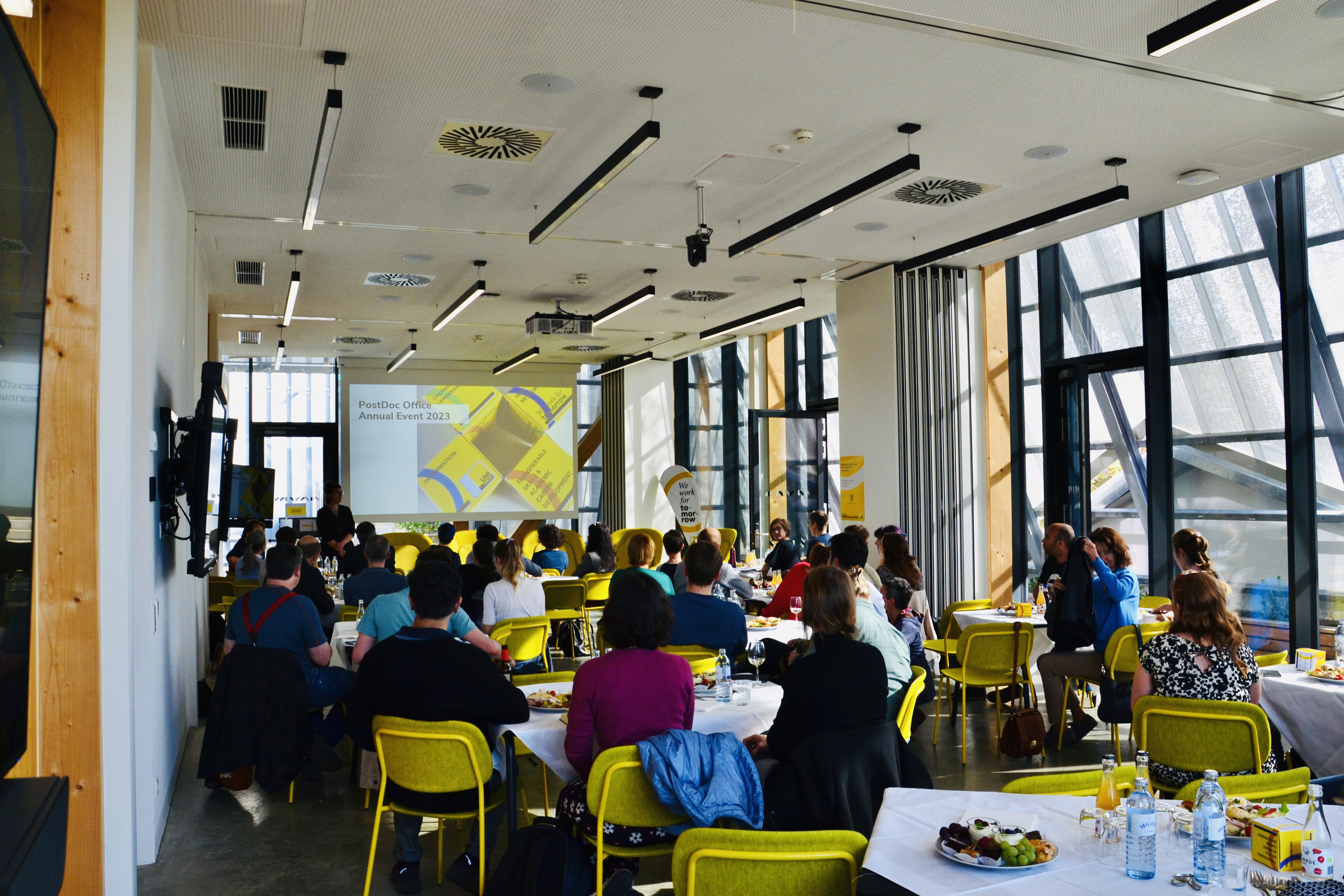Seven speakers and over 70 participants joined in an in-depth conversation about working conditions in academia at the PostDoc Office Annual Event at Unicorn Startup & Innovation Hub.
Joachim Reidl, Vice-Rector for Research, opened the event. He touched on many points that can be found in more detail in his interview by the Press and Communications Department: Bleiben oder gehen? - Das Online-Magazin der Uni (uni-graz.at)
The opening talks were held by a sociologist and a professional coach:
- Barbara Hönig, an expert in the sociology of science, started by explaining “meritocracy”: the powerful and motivating idea that all of us have the opportunity, with our talent, to contribute to science and research. Hönig outlined empirical research that shows that what actually shapes academia is a model of „success feeds success“ (the so-called Matthew effect). She connected these concepts with the current situation for postdoctoral researchers which is influenced by recent structural transformations of universities and university law. Hönig also provided suggestions for universities as well as for researchers on how to counteract challenging aspects of academia.
- Systemic coach, former researcher in biomathematics and European funding expert Yasmin Dolak-Struss then outlined how she coaches early career researchers to make decisions and take charge of their professional paths. She explained that systemic coaching takes into account the environment, provided tools for individual self-reflection and shared her experiences in working with researchers who are contemplating leaving academia.
A round table followed which explored what the ideal environment for research looks like. It brought perspectives from research, industry, activism, and university leadership.
- Christian Gruber researches dynamics of biomolecular systems and is also an innovator. From his international and start-up experience, he was able to outline the importance of building a feeling of belonging and community at a workplace. He also advocated for giving younger talents the flexibility to spend time abroad during a contract. And he stated that the "system" of academia is all of us and therefore has the potential to change, depending on who engages in it.
- Jana Lasser, a complex social systems researcher at Graz University of Technology, has extensive experience in academic service and committee work. Based on her engagement with the REMO COST Action and the Network Against Abuse of Power in Sciences (MaWI), she provided enlightening statistics on mental health and wellbeing of researchers compared to other populations. She described opportunities for postdoctoral researchers to participate in committes and shape their institutions, and she suggested staffing models that might make our universities more attractive to talents and might make career paths more sustainable.
- Ana Podvršič is an economist and sociologist and Marie Curie alumna. She provided insights into what MSCA fellowships contribute to individual career development. She is engaged in collectives that advocate for fairer working conditions at universities and offered a staffing/career path model that is intended lead to less precarity. She also introduced NUWiss, a new Austrian-wide initiative for mid-level faculty.
- Mireille van Poppel is a medical biologist and Vice-Rector for Internationalisation and Equal Opportunities. She outlined best practices from her experience as an internationally experienced researcher and mentor of younger scholars, and she described efforts by the University of Graz with regards to reforming criteria to assess researchers' careers.
As is always the case at PostDoc Office events, there was very active engagement from all participants, and an open spirit of discussion. It was controversional, and at the same time very solution-focussed.
Postdoctoral researchers are extremely productive, innovative and a key factor for the research output and teaching excellence of universities. The University of Graz recognizes this: two Vice-Rectors and many key stakeholders were present at the event and expressed their appreciation of this staff group.
The final act of the event was the certification ceremony for the members of the PostDoc Peer Mentoring Team 2022/23. Vice-Rector Reidl introduced the nine members of the professional development group and handed them their certificates. Historian Ionela Zaharia-Schintler spoke on behalf of the group and briefly described their achievements of the past year and highlighted the importance of this measure.
Academia as a system was thoroughly analysed , and actionable suggestions for improvement were made. This was based on insights from the sociology of science, insights from experts with decades of experience in advising researchers and insights from representatives of committees which shape universities. And, of course, on the lived experience of postdoctoral researchers themselves.
The PostDoc Office is committed to continuing this conversation and to do our part in creating an environment in which researcher can thrive. We're really grateful that so many people engage with us and contribute to the wonderful community we have here.
Report: Johanna Stadlbauer
